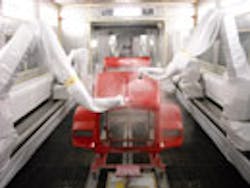Despite healthy revenues and profits being posted by truck makers and related suppliers, there’s growing uncertainty over the strength of Class 8 sales, with several OEMs reducing their forecasts, in part because of component shortages and a lack of production capacity.
“We have lowered the range [of Class 8 retail sales] due to the uneven economic recovery and supplier capacity constraints, especially tires and chassis components,” noted Dan Sobic, Paccar Corp.’s executive vp in the company’s second quarter earnings report.
“[We expect] Class 8 industry retail sales in the U.S. and Canada to be in the range of 180,000 to 200,000 vehicles in 2011,” he added. “The good news is that industry suppliers are investing in their facilities to meet increased market demands [and] our customers are benefiting from higher freight tonnage and improved fleet utilization rates, resulting in strong growth of our aftermarket parts sales.”
“Strong worldwide truck industry demand and a robust increase in truck build rates have created challenges for some suppliers,” added Mark Pigott, Paccar’s chairman & CEO, “[so we are] working closely with its suppliers to increase their production capacity in the next several months.”
Paccar – the parent company for Peterbilt Motors Co. and Kenworth Truck Co. in the U.S. and DAF Trucks N.V. in Europe – reported earnings of $239.7 million on net sales and financial services revenues of $3.96 billion in the second quarter, compared to $99.6 million and $2.46 billion, respectively, during the same quarter in 2010. For the first half of 2011, Paccar said its net income more than doubled to $433 million on 54% higher revenues of $7.24 billion compared to the same period last year.
By contrast, truck component supplier Eaton Corp. – which believes 2011 will set company records for sales and profits – is maintaining its robust Class 8 forecast for the year, pegged at 265,000 units for the “NAFTA region,” which includes the U.S., Canada, and Mexico. Outside NAFTA, however, Eaton expects markets to register more modest growth.”
“The year is shaping up to be better than we forecasted in April,” noted Alexander Cutler, Eaton’s chairman & CEO, in the company’s second quarter earnings statement. “We now anticipate our overall end markets will grow by 11% versus our earlier forecast of 10%.”
Eaton – which reported earnings in the second quarter this year jumped 47% to 97 cents per share on 21% higher revenues of $4.09 billion compared to the same quarter in 2010 – noted its truck segment posted operating profits of $120 million on record quarterly sales of $673 million, up 37% compared to 2010.
“Truck production in the second quarter was up 27%, with U.S. markets up 53% and non-U.S. markets up 5%,” said Cutler. “We also expect 2011 to be a year of record sales and record profits” for the entire company.
“Our total sales are projected to be 19% above 2010 and 6% above our previous annual sales record, which we achieved in 2008,” Cutler explained. “Our operating earnings per share at the midpoint of our guidance is 42% above 2010 and 16% above our previous operating earnings per share record. We are particularly encouraged by the outlook for our 2011 results, given that many of our significant businesses are just beginning to recover from the economic downturn of 2008 and 2009.”
Industry experts point out that the “order boards” for truck makers serving the North American markets are largely full, with any major “swings” in orders and sales expected to occur in the fourth quarter as fleets decide whether or not to add new vehicles to their operations in 2012.
“We believe that the OEMs are nearly fully booked for the year and are constrained in their ability to add more capacity, so any slowdown in order activity will have little effect on the 2011 production numbers,” said Eric Starks, president of FTR Associates. “We expect demand to begin picking up seasonally once again in the fourth quarter, and the strength of that upturn will determine the durability of the recovery and set the stage for 2012.”
About the Author
Sean Kilcarr
Editor in Chief
Sean Kilcarr is a former longtime FleetOwner senior editor who wrote for the publication from 2000 to 2018. He served as editor-in-chief from 2017 to 2018.
